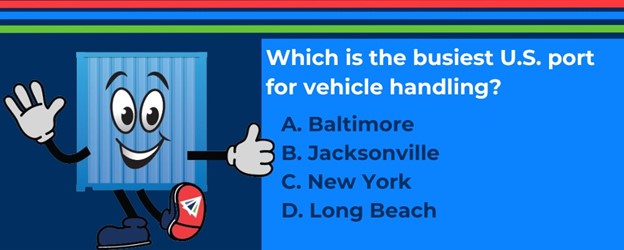Competitive Edge
August 14th, 2024
Stay Current with InterlogUSA
Latest Industry Happenings and Market Updates:
Across International Shipping: News and Developments
[Labor] USE/GC Longshore Negotiations: In an Aug. 9 statement, the United States Maritime Alliance (USMX) defended its wage and benefits proposals to unionized dockworkers amid a prolonged impasse in contract negotiations.
The International Longshoremen’s Association (ILA), the union representing some 45,000 dockworkers at East and Gulf coast ports, is reportedly seeking a wage increase that far surpasses the rate achieved during last year’s West Coast contract cycle. Union leadership maintains it will order a coastwide strike should their demands not be met prior to the current longshore contract expiring Sep. 30.
[Labor] Canada Railroad Negotiations: In respective statements, Canada’s two Class I railroads announced they will issue notice of employee lockouts on Aug. 22 should an agreement not be met by then with a union who represents 9,000 rail workers across both railroads’ transportation networks.
Railroads Canadian National and Canadian Pacific Kansas City (CPKC) and union Teamsters Canada Rail Conference (TCRC) are currently under a negotiation period for new collective bargaining agreements covering the railroads’ unionized workforce, including yard workers, engineers, and conductors. Talks between the two sides deteriorated earlier in the year, ultimately prompting intervention by Canada’s labor tribunal.
The threat of a lockout comes as TCRC wages its own tactics against the railroads. Over the summer, the union has organized two strike votes, solidifying its intentions to order rank-and-file rail workers to picket should demands not be met by railroad-employers.
IMPORT: Asia to North America (Transpacific Eastbound)
Rates: Rates from China origins to all U.S. coasts have relaxed over the past two weeks but remain relatively high when compared to historical averages.

Questions or concerns about a specific trade lane? Contact one of our team members today!
Space: There has been less pressure on space, particularly on sailings from China.
Capacity: Continued routings around Africa as well as port congestion in Asia have led to instances of blank sailings.
Routing: Protracted drought conditions at the Panama Canal have largely recovered. Local officials have eased the waterway’s restrictions on vessel traffic.
Relevant Content: Draft Restrictions at the Panama Canal Have Eased, What Lies Ahead?
TIPS:
- Hold your logistics partners accountable for frequent updates regarding current market conditions.
- Strongly consider booking shipments as soon as possible to avoid election uncertainty over trade tariffs as well as a potential dockworker strike in October (if no agreement is reached).
IMPORT: Europe to North America (Transatlantic Westbound)
Rates: Rates continue to decline in August. Ocean carriers will implement peak season surcharges (PSSs) on Sep. 1 in a bid to curb this trend.
Space: Space is open.
Capacity: If demand wanes, it will become a question of how carriers will manage a potential excess of capacities.
Labor: A potential longshore strike at East Coast ports in October is a primary concern for transatlantic routings.
TIPS:
- Book at least two weeks prior to the ready date.
- Stay in communication with your logistics providers on anticipated surcharges for this trade lane in September.
- Keep a pulse of ongoing labor tensions between East and Gulf coasts dockworkers and maritime employers. If feasible within your timeline, place inbound bookings in August and early September to avoid disruptions if there is a dockworker strike in the fall.
EXPORT: North America to Asia
EXPORT: North America to Asia
Rates: Rates have decreased for outbound shipments from all U.S. coasts. Conditions at West Coast ports are comparatively more volatile than conditions at East Coast ones.
Capacity: As seen during the pandemic, export service is vulnerable in periods when carriers set their focus on a more favorable import market, as prioritizing inbound business is more profitable. As peak import season holds steady, exporters should be cautious of how this can impact their cargo.
TIPS:
- Insufficient communication with sailing schedules can lead to higher detention and demurrage fees as well as higher trucking and storage costs. Ensure your logistics partners are not keeping you and your cargo in the dark.
Freight News
Explosion Disrupts Ningbo-Zhoushan Port, Hazardous Materials Possibly Involved
Transatlantic Outlook: Are Things Heating Up?
Last Friday, an explosion occurred at Ningbo-Zhoushan Port in eastern China, causing disruptions at one of the world’s busiest shipping hubs. The port’s Ningbo Beilun’s Phase 3 Terminal has since reopened (as of midnight August 12th), a variety of reports say, after being closed from dealing with the aftermath of the explosion.
The incident occurred on the YM Mobility; a container ship operated by Yang Ming. The blast originated from a container near the bow of the vessel. Yang Ming has stressed that the exact reason for the explosion remains to be clarified, but some reports say hazardous goods were involved.
Cargo insurance plays a role in cash management, risk mitigation, and corporate accountability. Don’t be the one coughing up non-existent cash to repurchase a product that could have been covered by all-risk marine insurance in the first place. Insure your cargo, get covered, and stay protected.
There has been some reports detailing ocean carriers intent to announce peak season surcharges (PSSs) in the beginning of September.
However, we like to view this as a ‘watch’ rather than a ‘warning’. We have not heard a lot of traction regarding this, but we have noticed some rates to begin to heat up in both directions on the Atlantic.
Throughout the year, capacity on the trans-Atlantic route has exceeded demand. To capitalize on higher rates, some of the larger vessels have been reassigned to Transpacific and Asia-Europe routes. Despite the overcapacity, Transatlantic carriers have minimized blank sailings. Forwarders doubt that any upcoming rate increases will be sustained unless there is a notable rise in blank sailings, a boost in demand, or disruptions at the ports.
Which is the Busiest U.S. Port for Vehicle Handling?
Johnny Cargo sure knows a lot! Other than fun facts, Johnny also can provide insight into InterlogUSA’s many service and pricing options. He is always available for a quick conversation.
Click HERE to chat with Johnny Cargo.

Webinar: Market Updates, Current Events
In our July webinar our team discussed:
— transpacific (west coast) and transatlantic (east coast) market conditions and updates
— any updates regarding the Panama Canal/Suez Canal?
Plus, recent current events in the industry:
— U.S. East/Gulf Coast Labor Negotiations
— Rough Weather in South Africa Impacts Vessels
— Canada Rail Union TCRC and CN/CPKC Bargaining Update
Sign up for our
industry answers
Our team works to provide valuable, unique, and relevant content to assist you in finding solutions. Sign up now.

